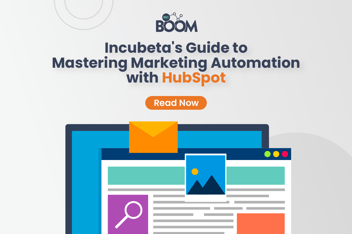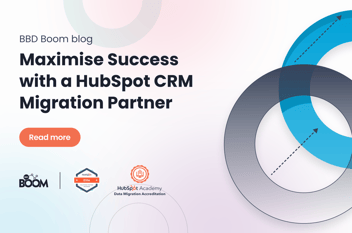Explore our comprehensive blog post on leveraging your CRM to enhance your marketing efforts, allowing you to connect with the right audience at the right moment. Overflowing with practical insights and actionable strategies for immediate implementation, this guide is your key to mastering the intricacies of contemporary marketing.
Understanding CRM and its Role in Marketing
Customer Relationship Management (CRM) is a powerful tool that can greatly enhance your marketing efforts. It involves managing and analysing customer interactions and data to improve customer relationships and drive sales. CRM allows businesses to gain valuable insights into customer behaviour, preferences, and needs, enabling them to deliver more targeted and personalised marketing campaigns.
By understanding CRM and its role in marketing, businesses can develop a deeper understanding of their customers, identify key trends and patterns, and make data-driven decisions that lead to better marketing strategies.
CRM provides a centralised database that stores detailed information about each customer, including contact information, purchase history, and interaction history. This allows businesses to track customer journeys and create personalised marketing campaigns that resonate with each individual customer.
In addition, CRM enables businesses to segment their customer base and target specific groups with tailored marketing messages. This level of personalisation not only increases engagement but also improves the overall customer experience.
Overall, understanding CRM and its role in marketing is crucial for businesses looking to maximise their marketing impact. By leveraging CRM data and insights, businesses can create more effective marketing campaigns, improve customer engagement, and ultimately drive sales and revenue.
Benefits of Integrating CRM in Marketing
1. Personalise at Scale
Personalising at scale is no longer a daunting task, thanks to the power of CRM systems like HubSpot. By leveraging CRM for targeted messaging, smart content creation, and effective segmentation, businesses can achieve remarkable results. Increased engagement, higher conversion rates, improved customer loyalty, and efficient marketing spend are just a few of the benefits. In the end, it’s about delivering the right message to the right person at the right time, and CRM makes this possible in a way that is both scalable and effective.
A robust CRM system, like HubSpot, acts as the central hub for all your customer data. This wealth of information allows you to craft messages that are not only relevant but also timely.
Personalisation goes beyond using a customer’s name in an email. It involves tailoring the entire customer experience based on their preferences and behaviours. CRM systems enable deep personalisation by providing insights into what your customers are interested in, their purchase history, and their interaction patterns.
With CRMs like HubSpot, businesses can also segment their customer base into different groups based on various criteria such as age, location, interests, and buying behaviour. This segmentation allows businesses to tailor their marketing campaigns to each specific group with the help of smart/dynamic content, increasing the chances of engagement and conversion.
How to use targeted campaigns for high quality leads? Find out here.
2. Enhance Customer Engagement
CRM plays a crucial role in enhancing customer engagement, which is essential for building strong and lasting relationships with customers. By leveraging CRM data and insights, businesses can gain a deeper understanding of their customers and provide personalised experiences that resonate with them.
CRM allows businesses to track customer interactions across various channels, including email, social media, and website visits. This data provides valuable insights into customer preferences, interests, and behaviours, allowing businesses to create targeted and relevant marketing messages.
With CRM, businesses can also implement customer engagement strategies such as loyalty programs, personalised offers, and proactive customer support. These strategies help businesses connect with customers on a deeper level, fostering loyalty and repeat business.

3. Data-Driven Decision Making
Data-driven decision making is a key advantage of leveraging CRM in marketing. CRM provides businesses with access to a wealth of customer data, which can be analysed to make informed decisions and optimise marketing strategies.
CRM also enables businesses to track the effectiveness of their marketing campaigns and measure key metrics such as customer acquisition cost, conversion rate, and customer lifetime value. This data-driven approach allows businesses to identify what works and what doesn't, making it easier to allocate resources and optimise marketing efforts for maximum impact.
Furthermore, CRM data can be used for predictive modelling and forecasting, helping businesses anticipate customer needs and preferences. This proactive approach allows businesses to stay ahead of the competition and deliver personalised experiences that meet customer expectations.
4. Improve Return on Investment
 One of the key benefits of CRM in marketing is improved return on investment (ROI). By leveraging CRM data and insights, businesses can optimise their marketing efforts to generate higher returns and maximise their marketing impact.
One of the key benefits of CRM in marketing is improved return on investment (ROI). By leveraging CRM data and insights, businesses can optimise their marketing efforts to generate higher returns and maximise their marketing impact.
As we mentioned above, CRM allows businesses to track the effectiveness of their marketing campaigns. By focusing on the most effective channels and strategies, businesses can reduce wasteful spending and achieve higher ROI.
CRM also enables businesses to identify and prioritise high-value customers, allowing them to allocate resources more efficiently and deliver personalised experiences to their most valuable customers. This targeted approach not only increases customer satisfaction but also drives higher customer lifetime value.
How to get 758% ROI with HubSpot? Find out here.
5. Automate Marketing Efforts
Automation is a game-changer in marketing, boosting both efficiency and effectiveness. CRMs such as HubSpot help automate tasks like lead nurturing, email marketing, social media management, lead scoring, and content creation or distribution. This saves time, ensures personalised and timely communication, and enhances engagement all at once.
Analytics and reporting are also enhanced through automation. HubSpot provides automated reports that track the performance of your marketing campaigns, giving you real-time insights into what’s working and what’s not. You can set up custom dashboards that display key metrics such as website traffic, conversion rates, and ROI, allowing you to make data-driven decisions quickly. Automated reporting saves time and ensures that you always have access to up-to-date information to guide your marketing strategy.
How to streamline your marketing efforts? Find out here.
Best Practices for Maximising Marketing Impact with CRM
1. Aligning Marketing and Sales
For CRM to be truly effective, it’s crucial to align your marketing and sales teams. By ensuring both teams are on the same page, you can create a seamless customer journey from lead generation to conversion.
Strategy: Shared Goals and Metrics
Implement shared goals and metrics for your marketing and sales teams. Use HubSpot CRM to track these metrics and hold regular meetings to review progress and address any issues.
2. Leveraging Customer Insights
Use the data collected in your CRM to gain deeper insights into your customers. Understand their pain points, preferences, and behaviour patterns to create more targeted and effective marketing campaigns.
Approach: Customer Feedback Loops
Implement feedback loops to continuously gather and analyse customer feedback. Use this data to refine your marketing messages and improve customer satisfaction.
3. Continuous Testing and Optimisation
The digital marketing landscape is constantly evolving, and what works today may not work tomorrow. Use your CRM to continuously test and optimise your marketing strategies.
Technique: A/B Testing
Run A/B tests on your email campaigns, landing pages, and call-to-action buttons. Use the insights gained from these tests to refine your strategies and improve performance.
Trends in CRM and Marketing
As technology continues to evolve, so does the landscape of customer relationship management (CRM) and marketing. Staying ahead of these trends is crucial for businesses aiming to maintain a competitive edge. Here are three key trends shaping the future of CRM and marketing:
Trend 1: AI and Machine Learning
AI and machine learning are transforming CRM by enabling more sophisticated data analysis, personalisation and content creation. Look for CRM systems that leverage these technologies to stay ahead of the curve.
HubSpot, for example, offer multiple AI-powered tools to help you market better, including blog and copy writing, report creation, image generation, content remix, and AI chatbots.
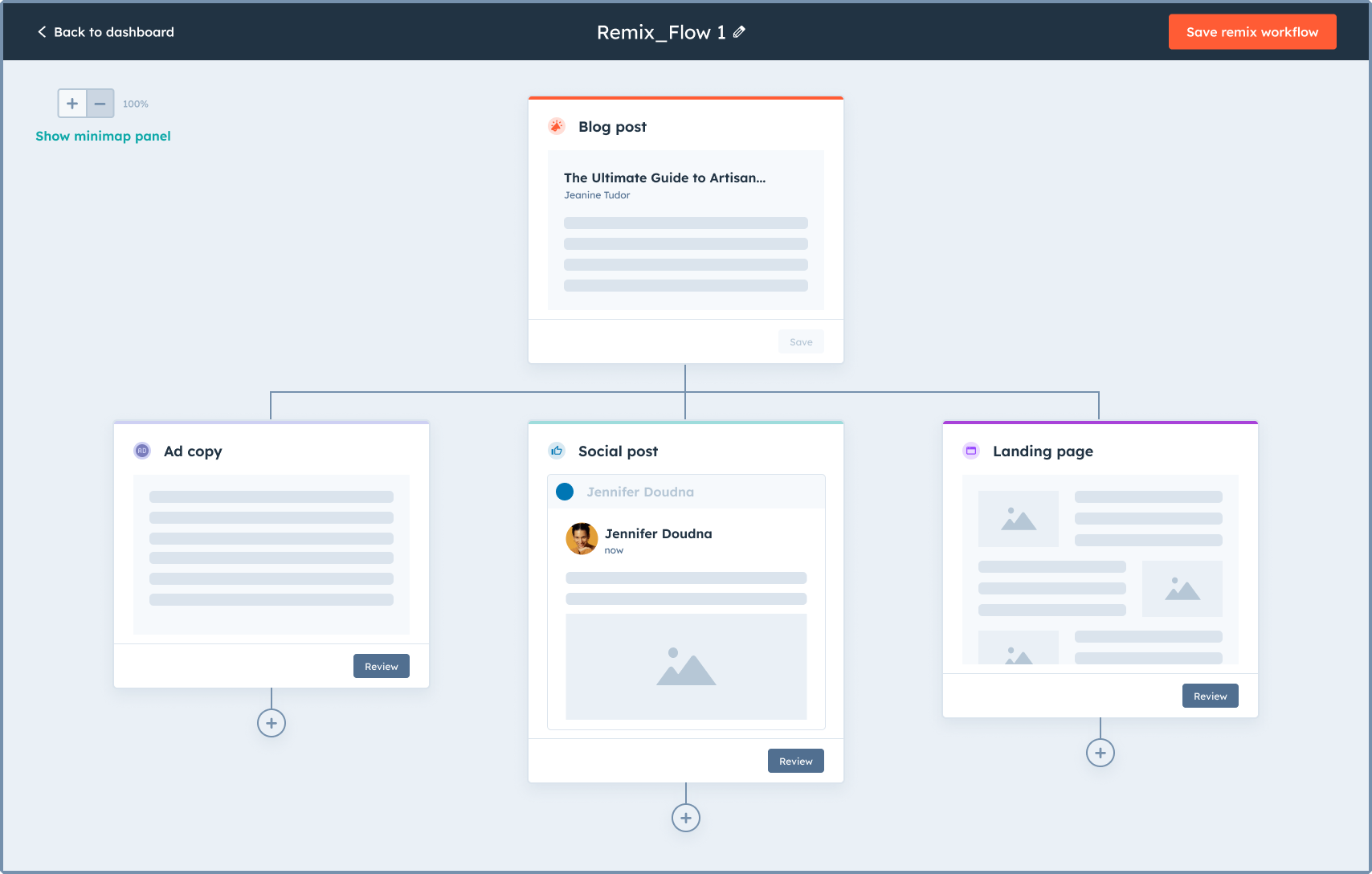
Trend 2: Omni-channel Marketing
Today's consumers interact with brands across multiple channels, including email, social media, websites, and in-store visits. Omni-channel marketing aims to create a seamless and integrated customer experience across all these touch points. CRM systems are evolving to support omni-channel marketing by providing a unified view of customer interactions, regardless of the channel.
To fully leverage the benefits of omni-channel marketing, ensure your CRM system can integrate with various marketing platforms and channels. This integration will enable you to deliver consistent and personalised experiences, enhancing customer satisfaction and loyalty.
Trend 3: Customer Experience
Customer experience (CX) is becoming a key differentiator for businesses in a competitive market. Modern consumers expect more than just high-quality products; they want exceptional experiences that make them feel valued and understood. CRM systems play a crucial role in gathering and analysing data about customer behaviour and preferences, which can then be used to create personalised and memorable experiences.
Investing in a CRM system that prioritises customer experience will help you build stronger relationships with your customers, increase retention rates, and foster brand loyalty. For example, with health scores in HubSpot makes it simpler than ever to proactively cater to your customers' needs, all within a centralised platform.

Curious How HubSpot Can Help?
Navigating the rapidly evolving landscape of CRM and marketing can be challenging, but with the right tools, it's an exciting journey toward greater efficiency, personalisation, and customer satisfaction.
HubSpot CRM is designed to help businesses stay ahead of trends like AI-driven data analysis, omni-channel marketing, and exceptional customer experiences. By integrating powerful features that streamline processes and enhance customer engagement, HubSpot ensures that your marketing efforts are always optimised and impactful.
Ready to see how HubSpot can transform your marketing strategy and drive your business forward? Click the "Let's Talk" button bellow to get in touch with our team of experts and get started on your journey to CRM-powered marketing excellence:
.png?width=877&height=508&name=bbd-boom-siloy-navy+blue-logo%20(1).png)
.png)
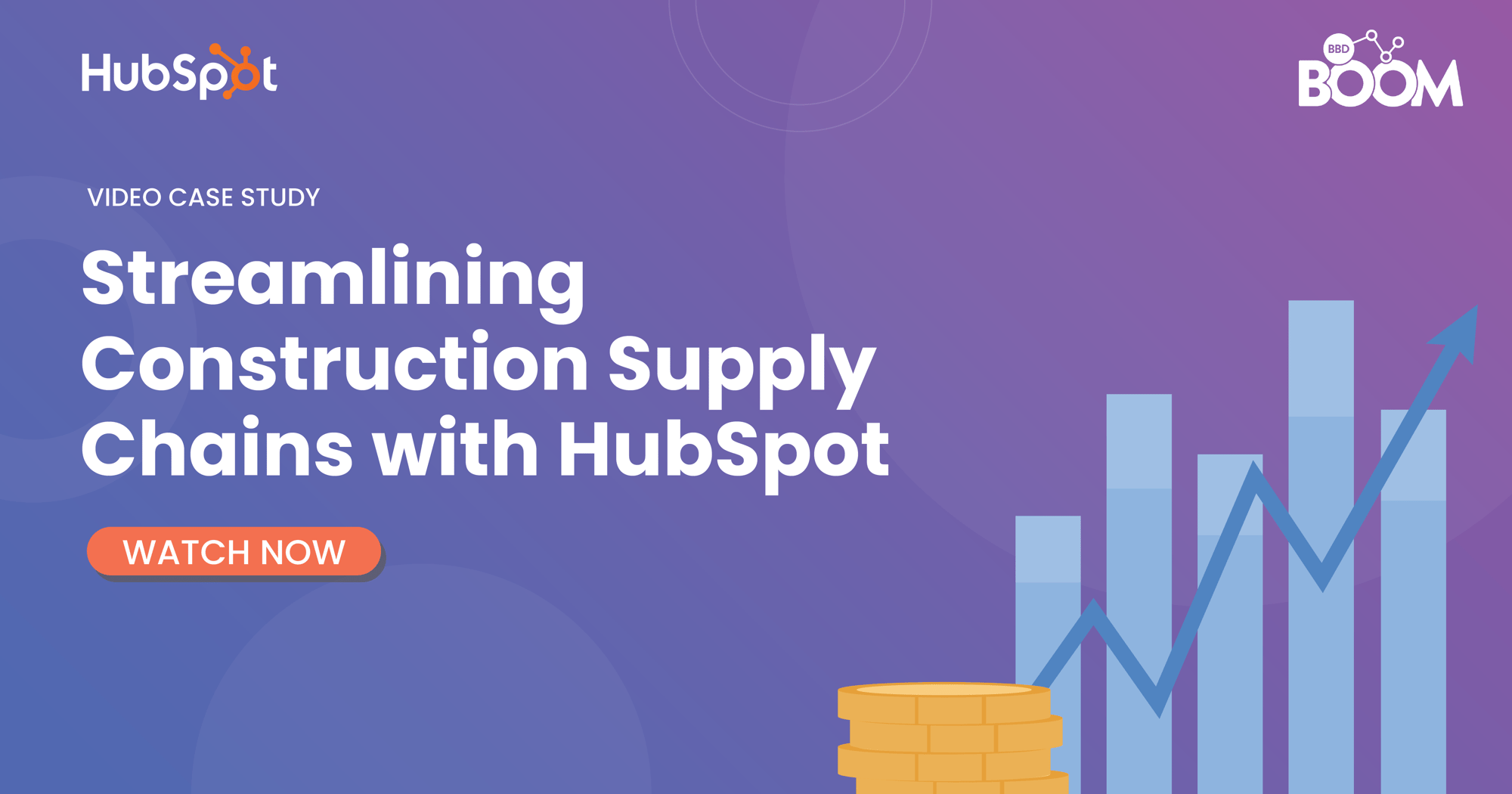
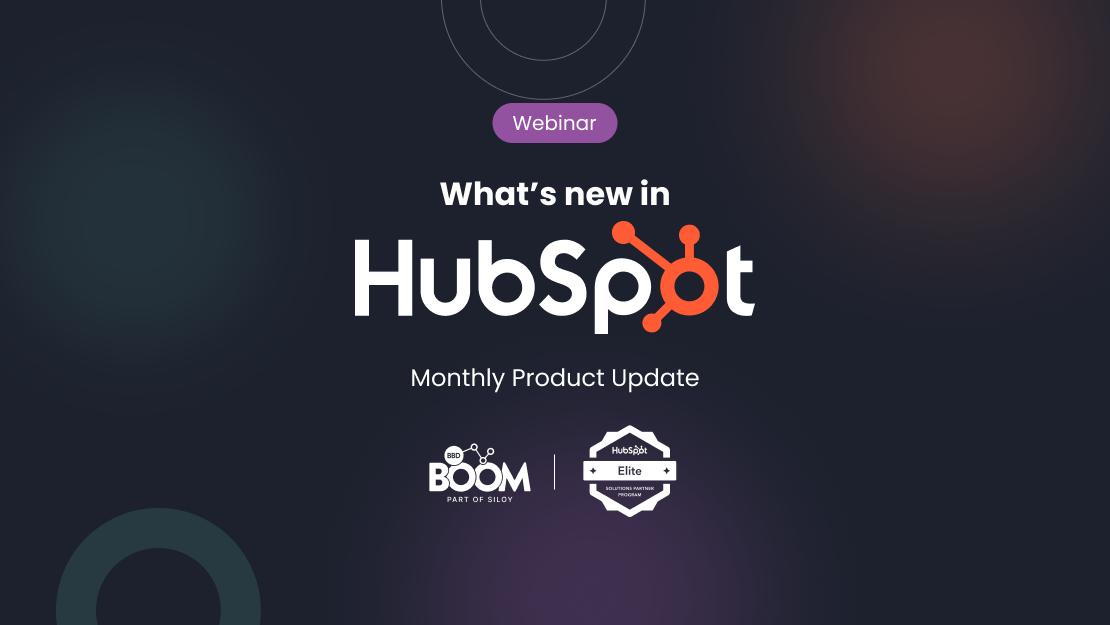

.png?width=50&name=Webinar%20Speaker%20(1).png)
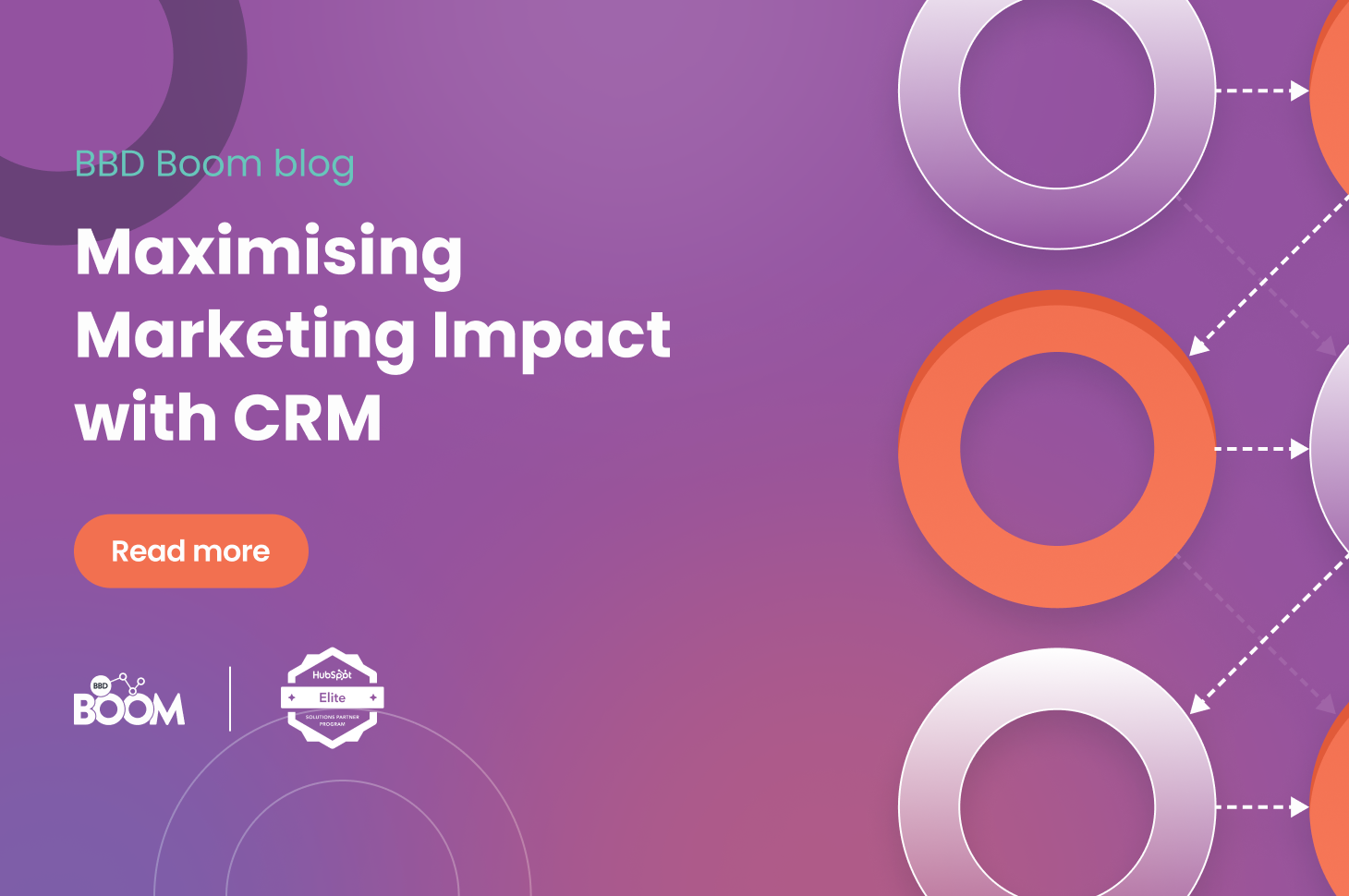


.png?width=90&name=Webinar%20Speaker%20(1).png)
